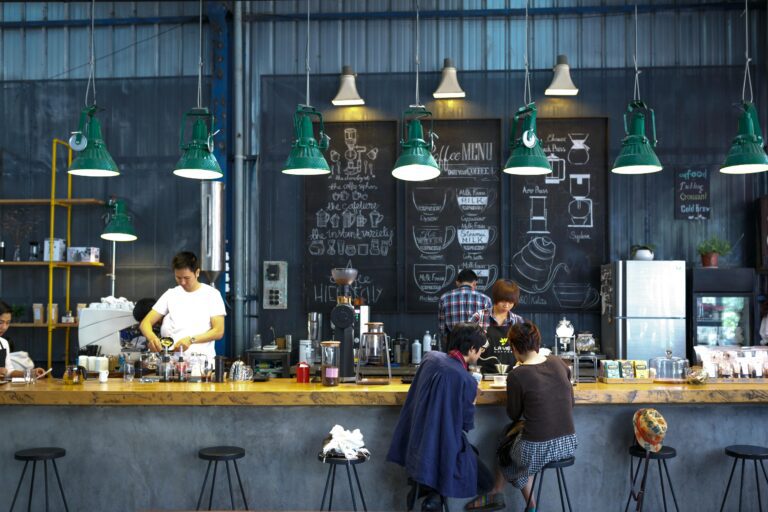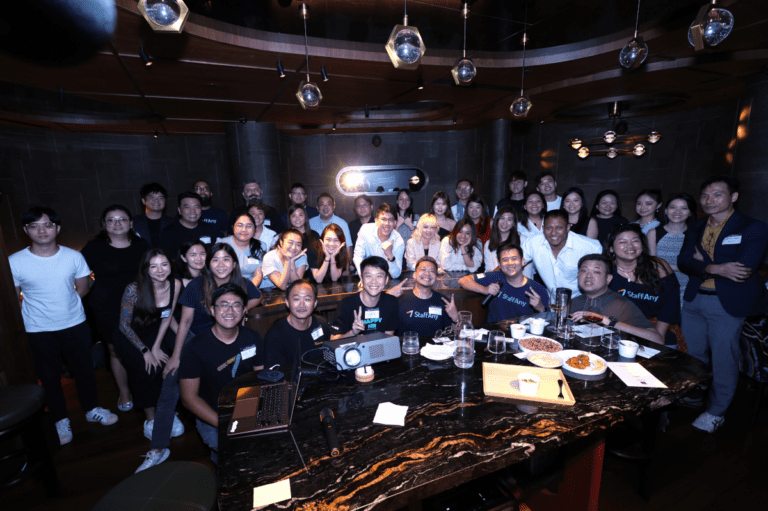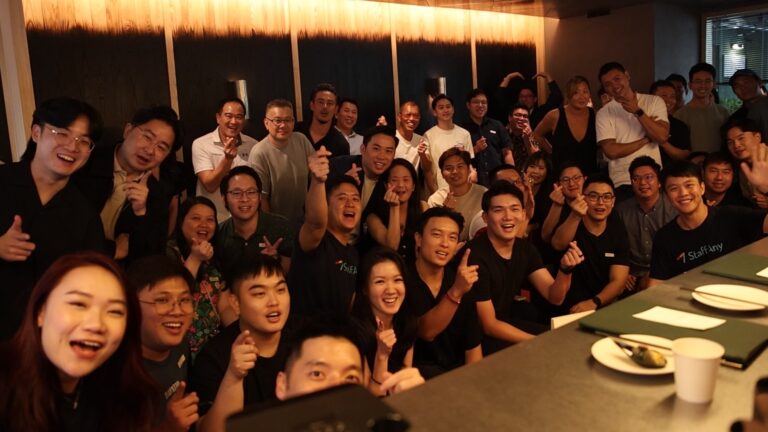
F&Bs Launching New Initiatives During A Pandemic
Why launch something new amidst what it seems to be chaos?
With all the excitement since phase 2’s beginning, we’ve not forgotten our beloved F&B community! This Wok the Talk episode, we have speakers Frank, Co-Founder of Laut Collective and American Taproom, as well as Wei Jie, Co-Founder and Director of Foreword. Together, we tackled what it means to launch out amidst COVID-19.
Key topics include:
- Major pivots made in response to the pandemic
- Original plans pre-COVID and how it has changed since
- Upcoming projects in this new phase
Checkpoint! How’s everyone doing?
With us in the midst of phase 2, we started out by checking-in on where everyone is at. Frank shared that for Laut, safety is still priority. Though Singapore is in phase 2, COVID is still around and so the main focus right now is not to maximise profits, but ensure locations are not overcrowded. Customers come first – and as long as they have a good dining experience and Laut can break even, the goals of this season are well met.
For Wei Jie, Foreword is currently operating two out of three of their locations. As the office crowds have yet to stream back, current efforts are still focused on online retail. #wfh is also still mandatory, so Wei Jie and his team had to look for alternatives during this time. Eventually, they expanded their product lines and came up with coffee bags and will be coming up with nespresso pods and cold brews. Plans to ship internationally were also in the pipeline but seeing that it comes with a heavy load on the marketing team, it is still in the planning stage.
Expectation v Reality: how plans have changed since COVID
Besides coffee, Foreword is also known for their coffee events and workshops. 2019 was a great year for the team and 2020 plans included expanding on their mobile barista kiosks and doing more events. However with COVID-19, these plans were shelved and the team had to quickly re-focus resources online via digital marketing and content creation. Throughout the Circuit Breaker period, the Foreword team also realised that many people were gifting to show support and care for their friends’ support. With personalization being a significant part of gifting, the team added cards in their offerings too.
Frank too, had a very different plan in mind. The initial concept for Laut was a pure dine-in only restaurant. Rooted richly in the South-East Asian culture, Laut heavily focuses on the produce they use and the experience customers get in store. However with dine-in no longer possible, the team had to switch to a full online delivery menu, moving to takeaway bottled cocktails instead.

Frank shared his gratitude to his network of good friends who helped build up a website for Laut in a short span of 3-5 days. The biggest pivot was definitely the bottled cocktails where they had to pre-batch everything. These took 4-5 days to make and being a lean team, everyone was working round the clock to make the deliveries and orders happen. Here, Frank added that he realised how important time management is, and ensuring that the team is not overworking themselves.
The Trigger
So what exactly triggered our speakers to make these major pivots? Frank shared that for Laut, the online platform was only supposed to launch next year. With hints on the lockdown, it was a sign to pivot. Buying produce in such short notice and visiting different markets across the country to procure them was a mad scramble. In hindsight, Frank was thankful to have made that call or else they would have been stuck.
Similarly for Wei Jie, they were fortunate that they were already building up their Foreword website coupled with a rebranding. It was up by 1st April which coincided with their 3rd year anniversary (and Circuit Breaker!) Doubling down on social media and digital marketing efforts, everything came together to help with their online presence. Once online orders began, business started to pick up.

If you’ve seen Foreword’s bottled lattes – these were initially launched to clear off old stocks of bottles. However, the team saw a good market response and ended up ordering new batches. Once delivery was available, they were doing about 20 to 30 deliveries every single day and this also sparked a recycling program since Singapore had a shortage of glass bottles at one point. The trigger point for Wei Jie was knowing that the situation would not get better within a short span of time so they had to adapt and see what new initiatives they could do during this period.
Out with the old, In with the new
The situation is ever changing and F&Bs must adapt – new strategies and plans are always on the horizon. Wei Jie shared that an initial freight and shipment problem actually worked out in their favour. Due to supply chain disruptions, they got their coffee beans a lot later this year and ended up with a surplus of coffee beans on hand currently. Previously, this was in preparation for a new outlet slated to open, but has since been delayed. In the end, the team took a more consumer friendly approach by roasting the beans and packaging them with nitrogen flush so that it will last a lot longer. Doing large corporate orders also helped to move stocks quickly – To catch up with demand, the team will be roasting more coffee and bagging them faster in expectation of a higher demand soon.
The corporate route
For F&Bs, it may seem rather unorthodox to venture down the corporate route. What are some considerations and how do F&Bs take it from brainstorming to execution?
At Foreword, people are of high value. As the team only schedule full timers at the cafes, it was very hard to engage their part timers during this period. So going corporate actually gave Foreword a chance to involve them by roping them in to help with packing of the corporate gifts. As Foreword also employs persons with disabilities and special needs, they had to keep in mind that this transition in job scope from what they were used to previously would require increased guidance and support.
As for Frank, he shared that Laut only works with a local distiller in Singapore where they make local spirits with special ingredients. Throughout the last 3 to 4 months of working with them, Frank realised the need to help their suppliers as much as they were trying to help themselves. He thus made the decision to utilize his background in distribution and represent his supplier, Compendium, from August onwards. Through this, he hopes that it will help his supplies get to where they need to be. Frank emphasized that network building is very important to support each other in tougher times. Furthermore, with a long-term relationship in mind, it is a win-win situation when F&Bs thrive with their suppliers.
We all need somebody to lean on

When launching a new initiative or coming up with something new, one has to take into consideration what it means for the team and how they feel.
Foreword strongly believes in the team sharing a common vision. Launching something new is surely fun and exciting but it is important to ensure everyone is aligned with the vision and knows what the plans are. This is especially so when it’s a project not everyone is involved in. Foreword recently ran an initiative that delivered bottled lattes to all the polyclinics in Singapore. With the team churning 200 bottles for every polyclinic and doing this for 10 days non-stop, it was key for Wei Jie to ensure good communication within the staff. Further emphasizing that building trust and transparency with employees is very important. It was also heartwarming as there was never a complaint or doubt within the team.
On this point, Frank chimed in that it’s important to get your hands dirty with the team to build a sense of team support. Talk is cheap, but when you get on the ground and hustle with your staff, they feel your support – even small gestures like washing dishes or cutting fruits with them when they are tired.
The 2020 problem of Burnout
Let’s be honest, this pandemic is taking a huge toll on us. This is an issue that hit close to home for Frank as he recently saw the effects of burnout on his business – when some guests gave feedback that the quality of food was not the same. “When you’re burnt out, you think that you’re doing the same thing. But the end result is very different”.
F&B burnout during COVID is real. Yet, staff may not feel comfortable voicing it out. Frank encourages managers to be the one to take initiative and reach out to ask how they are doing and if they need help – or else if you wait to find out, it could be too late.
Wei Jie echoes the same sentiments – managers set the standards and boundaries for staff. At Foreword, employees can interact and chat after 7pm but work discussions are strictly prohibited. They also have a check-in meeting twice a week, once online and once face-to-face. This helps keep tabs on employees’ well-being and co-founders can help take over if they need a break. With regards to lowering the risk of burnout, both speakers agreed that an incentive system would definitely help improve employee motivation and engagement, especially in larger teams.
O2O Marketing Strategies

A popular question from the floor: what are current O2O strategies F&Bs can adopt?
Since phase 2 started, online sales for Laut had dropped drastically. Hence Frank made the executive decision to stop food delivery and only deliver cocktails. For with food, it will never taste as good as having it on-the-spot. In hindsight, Frank said that if the team were to go online again in the future, what they would do differently is to tweak the menu into a tasting menu that offers pairing items and set menus with drinks. In terms of online strategies, social media and a good website is important to help consumers have confidence that this new restaurant knows what they’re doing. All in all, marketing and gaining online presence is a long term investment.
Wei Jie shared that it can be enticing to join many platforms and engage in many strategies – however, these may risk diluting the brand image. One needs to be sure that it actually helps the brand and not erode earnings. Another concern would be whether or not your product can withstand the delivery distance. If it reaches your customers and it doesn’t look or taste good, it may not be wise to pursue online methods. While Foreword started off more opportunistic and put themselves out on multiple platforms, they are now reviewing them to see which works best for the brand.
Fresher Marketing Strategies
In a bid to attract new customers, Frank called up a friend who owns the best bar in Hong Kong called COA. COA specializes in tequila and mezcal and so Frank decided to fly these cocktails into Singapore and collaborate with COA. After trying the cocktails, Frank got the recipe and they made them, bottled them and sold them as a package on their website. They got Jay, the owner of COA to make a video in a cross marketing effort and this benefitted them both parties mutually. Through this, Frank knew that collaborations are a good strategy to work with.
Coffee is a very competitive space. During the Circuit Breaker period, the Foreword team went back to the drawing board to look at the platform they could be on, partners they want to collaborate with and how they can personalize the experience for consumers. Instead of giving discounts and engaging in price war, they took the path of content creation. For instance, collaborating with their Laos suppliers to create a video about the bean to cup journey. This was in turn shared with their customers which instilled a greater sense of identity behind the Foreword brand.
Exploring new land

Before we parted, our panel left us one last insight on expansion. Both had expansion plans but agree that it is not the right time.
Frank urges anyone in the audience who might be looking to expand, to use this downtime to plan and get ready for future outlets. Preparation is key to hitting the market at the right time. If one plans well, survivability should not be a problem no matter how difficult the situation gets.
Foreword too is putting a pause on local expansion until people are more confident to go out and foot fall comes in again. The brand is definitely still looking to go global; the social mission has always been a big part of Foreword and they are also looking at ways to give back to the top of the chain coffee producers who earn very little. The coffee chain is also notoriously unsustainable and the team would like to make a difference to that. Wei Jie is also looking to tap into the SGUnited traineeship to increase manpower and grow the business.
Wow! Next ep please 🙂
Moving forward, businesses can take a leaf from these pointers:
- Curating and strengthening relationships with suppliers & partners
- Adopting the B2B model as a business strategy
- Find ways to encourage or incentivise staff to ensure optimum productivity of your manpower
That’s it from us! See you all on the Wok the Talk ep 5, happening in September 🙂
Leave your details below to get first dips on it!











